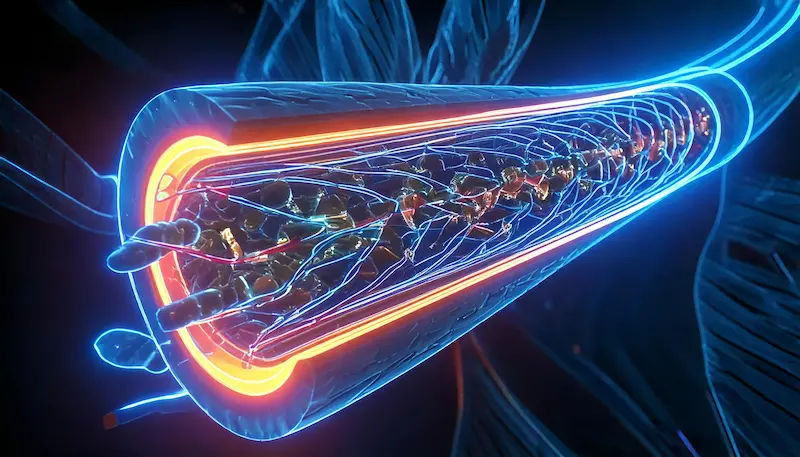Complete Heart Block: Causes and Effects
Complete heart block can lead to severe life-threatening complications. Learn about the causes and effects of complete heart block to maintain a healthy heart.

Written by Dr Shreya Sarkar
Last updated on 13th Jan, 2026
Disrupting electrical signals that control one's heartbeat leads to heart block. This disruption can lead to varying degrees of heart rate abnormalities, such as first-degree, second-degree, and third-degree (complete heart block).
The third-degree or complete heart block is the most severe and requires immediate medical attention due to its potentially life-threatening consequences. Keep reading to learn about complete heart block, its causes, effects, and prevention.
Causes of Complete Heart Block
In most cases, blockage in the heart develops with age as the nerve connecting the heart from top to bottom fails. However, some people develop heart block since birth due to the mother’s heart issues during the pregnancy period.
Here are some other factors that cause heart block risks in an individual:
Degeneration of the heart’s electrical system
Heart failure
Cardiomyopathy
Coronary artery disease
Heart attack that damages the electrical system of the heart
Certain medicines like calcium channel blockers or beta-blockers that slow down the electrical impulses of heart
Temporary disruption in the electrical system of the heart due to electrolyte abnormalities
How Does a Complete Heart Block Affect the Body?
In a complete heart block, the atria and ventricles beat independently, which can lead to significantly reduced cardiac output. The ventricles may beat much slower (often below 40 beats per minute), resulting in insufficient blood being pumped to meet the body's needs. This can lead to fatigue and weakness due to inadequate blood flow.
The lack of coordinated contractions between the atria and ventricles impairs adequate blood circulation. Consequently, vital organs may receive insufficient oxygen and nutrients. This can result in symptoms like dizziness, fainting, and, in severe cases, organ damage due to prolonged hypoxia.
Symptoms of Complete Heart Block
Depending on the severity of the blockage and its effect on the heart’s pumping function, heart block has the following symptoms:
Palpitations
Nausea
Chest pain
Fatigue
Breathing difficulties
Rapid breathing
Fainting
Dizziness, etc.
There are three stages of heart block. The first degree usually has no symptoms and can be detected only during a routine ECG (electrocardiogram). However, the severe stage, i.e. third-degree, slows down the heart rate and causes intense effects. Individuals getting severe symptoms of complete heart block should visit the doctor immediately.
Consult Top Cardiologist
Diagnosis of Complete Heart Block
Heart blockage is usually diagnosed through ECG (electrocardiogram), as it helps the doctor assess the electrical activity in one’s heart. It is a non-invasive test in which the doctors place electrodes on an individual’s chest to record the electrical activity in the heart.
ECG can help detect complete heart block and various other types of arrhythmias. However, heart block cannot be diagnosed through ECG in some cases, as complete heart block may be intermittent.
Thus, it is essential to monitor the heart rhythm while diagnosing heart blockage. In this test, a Holter monitor is attached to an individual’s chest to record and monitor heart rate for 24 hours continuously.
Here are some more ways to diagnose complete heart block:
The doctor performs a physical test
Symptoms are discussed with the patient, and their medical history is reviewed
Medicines taken by the individual are examined while recommending a test
Doctors review the individual’s medical history
Treatment Options for Complete Heart Block
Depending on the type of heart blockage, there are different types of treatment for a complete heart block.
In case of first-degree or mild heart blockage where individuals do not have any severe symptoms, a regular check-up and timely medicine are enough.However, for the second or third-degree blockage, individuals need to get a pacemaker placed under the skin of their chest to normalise their heartbeat. A small device like a wristwatch produces electrical signals to make one’s heart rate and rhythm regular.
For mild heart blockage that can be resolved in a short span, doctors use a temporary pacemaker. It is also used before the permanent pacemaker implantation in one’s body during emergency situations. This device does not need an implantation into one’s body. Instead, it is connected to the heart through a wire that passes through the veins.
Potential Complications of Unmanaged Heart Block
Here are some of the complications one may develop due to heart blockage:
Fainting
Skipped or racing heartbeats
Pain in the chest
Weakness
Risks of atrial fibrillation or other arrhythmias
Dizziness
Breathing problems
Risks of heart attack
Swollen legs, feet, ankles, etc.
Note: Strong magnetic fields are harmful for people with pacemakers. So, they should avoid tests like MRI scans or ask for some alternative security screenings in airports or similar places.
Living with Complete Heart Block
Individuals with complete heart block should follow the proper guidelines while taking medication or maintaining the pacemaker. A routine check-up is always necessary to keep track of the treatment procedure.
Here are some of the tips for individuals living with complete heart blockage:
Individuals should opt for a routine pacemaker check to ensure the functionality of the device
Individuals should always carry a card that mentions they have a pacemaker
Staying active is encouraged, but engaging in sports or other stressful physical activities should be avoided
All healthcare providers of the individual must be aware of his/her pacemaker implantation
Preventative Measures for Heart Block
One can follow these guidelines to prevent the causes of heart block:
Maintaining a Healthy Lifestyle
A healthy lifestyle can protect an individual from various complications. A healthy heart can prevent conditions like blockage. Thus, one must consume foods like nuts, soy products, seeds, vegetables and legumes that strengthen the heart.
Some other lifestyle management that helps in healthy heart functioning include stress reduction activities, regular exercise, sound sleep, quitting smoking, limiting alcohol intake, etc.
Managing Risk Factors
Calcium, magnesium, and potassium play a crucial role in maintaining the electrical system of one’s heart. Individuals taking any supplements or drugs must consult with their healthcare provider. They can change the dosage or drug class if it affects the expected levels of specific substances in one’s body.
Effective management of risk factors such as hypertension, diabetes, and high cholesterol can help prevent further complications related to complete heart block. Patients should manage any underlying conditions that could contribute to electrical conduction issues.
Conclusion
Individuals with complete heart block should undergo timely diagnosis and treatment to prevent further complications. Many patients can lead normal lives with appropriate medical intervention such as pacemaker implantation.
Regular monitoring and proper lifestyle adjustments play key roles in maintaining health and preventing complications associated with this serious cardiac issue.
Consult Top Cardiologist
Consult Top Cardiologist

Dr. Anand Ravi
General Physician
2 Years • MBBS
Bengaluru
PRESTIGE SHANTHINIKETAN - SOCIETY CLINIC, Bengaluru

Dr. Tripti Deb
Cardiologist
40 Years • MBBS, MD, DM, FACC, FESC
Hyderabad
Apollo Hospitals Jubilee Hills, Hyderabad
Dr Moytree Baruah
Cardiologist
10 Years • MBBS, PGDCC
Guwahati
Apollo Clinic Guwahati, Assam, Guwahati

Dr. Zulkarnain
General Physician
2 Years • MBBS, PGDM, FFM
Bengaluru
PRESTIGE SHANTHINIKETAN - SOCIETY CLINIC, Bengaluru

Dr. E Prabhakar Sastry
General Physician/ Internal Medicine Specialist
40 Years • MD(Internal Medicine)
Manikonda Jagir
Apollo Clinic, Manikonda, Manikonda Jagir
(175+ Patients)
Consult Top Cardiologist

Dr. Anand Ravi
General Physician
2 Years • MBBS
Bengaluru
PRESTIGE SHANTHINIKETAN - SOCIETY CLINIC, Bengaluru

Dr. Tripti Deb
Cardiologist
40 Years • MBBS, MD, DM, FACC, FESC
Hyderabad
Apollo Hospitals Jubilee Hills, Hyderabad
Dr Moytree Baruah
Cardiologist
10 Years • MBBS, PGDCC
Guwahati
Apollo Clinic Guwahati, Assam, Guwahati

Dr. Zulkarnain
General Physician
2 Years • MBBS, PGDM, FFM
Bengaluru
PRESTIGE SHANTHINIKETAN - SOCIETY CLINIC, Bengaluru

Dr. E Prabhakar Sastry
General Physician/ Internal Medicine Specialist
40 Years • MD(Internal Medicine)
Manikonda Jagir
Apollo Clinic, Manikonda, Manikonda Jagir
(175+ Patients)


